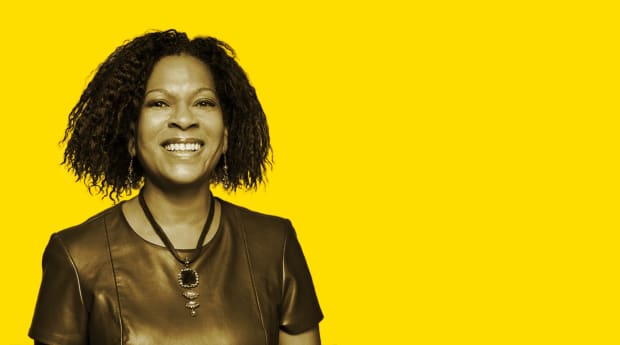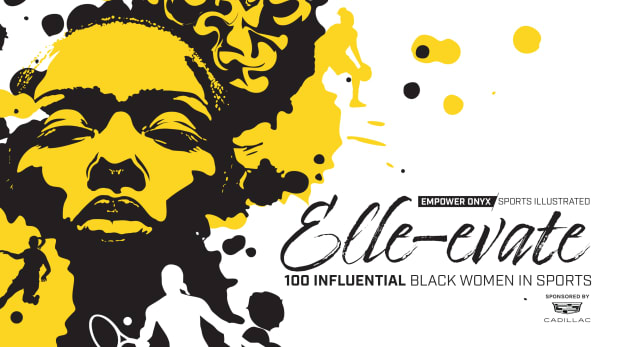
Courtesy of WarnerMedia
Sports Illustrated and Empower Onyx are putting the spotlight on the diverse journeys of Black women across sports—from the veteran athletes, to up-and-coming stars, coaches, executives and more—in the series, Elle-evate: 100 Influential Black Women in Sports.
In the spring of 2020, sports as we knew them were forever changed. As the pandemic brought the competition calendar to a screeching halt, the unjust killings of George Floyd, Breonna Taylor and more unarmed Black Americans had athletes demonstrating against institutionalized racism like never before. The louder LeBron James, Eric Reid, Bubba Wallace and others became about acknowledging the racial reckoning taking place outside the painted lines, the more it became impossible for the media that follow these stars to simply “stick to sports.”
But while many outlets struggled to make that pivot, Turner Sports was already well positioned. Its NBA studio crew in particular has never been shy about broaching topics beyond the game over the years and even gave lead voice Charles Barkley his own docuseries expressly to delve into the subject of race. So it figured that just before the NBA’s late-July restart, the network came back with the debut of The Arena—an hourlong series that examines the deeper issues affecting sports, through a mix of rich storytelling and probing analysis from Barkley, NBA champions Dwyane Wade and Draymond Green, host Cari Champion and others. And seeing that diversity of people and perspectives is the kind of thing that makes Johnita Due proud to be part of the process. “I just feel like the sports organization is one of the most nimble and innovative groups when it comes to diversity and inclusion,” she says. “I wish I could take credit for all of that, but I can’t.”
Still, she certainly deserves her share as WarnerMedia’s senior vice president and chief diversity, equity and inclusion officer—a remit that includes about 5,000 employees across the company’s news and sports divisions. When it comes to diversity and inclusion, WarnerMedia can claim a better track record than most. Turner Broadcasting—just to name one legacy property—cast Bernard Shaw, Fred Hickman and Christiane Amanpour in prominent on-camera roles at the network’s launch in the early ’80s, while robustly employing scores of Black and brown Atlantans behind the camera. Meanwhile, the diversity and inclusion post at many companies is often little more than a formality. But Due’s role at WarnerMedia wasn’t driven by the recent wave of black-square, virtue-signaling corporate guilt. “There’s just something in the culture here where there is an openness, and an expectation around inclusion,” she says. “But it’s been important to build on the past.”
For Due, that past extends well beyond her 16 years’ experience at Turner. Before joining CNN from the McGraw Hill media company as a media lawyer in 2003, the 54-year-old Miami native earned a bachelor’s degree in psychology from Harvard and a master’s in psychology from University of Sussex in England while studying race relations and organizational culture under a Rotary International ambassadorial scholarship. After adding a law degree from Cornell, Due landed a postgrad job in New York with the illustrious firm Winthrop, Stimson, Putnam & Roberts; there, she scored a primo pro bono fellowship working in Rome as vice president of S.O.S. Razzismo Italia, a nonprofit that fights discrimination against immigrants and people of color.
You could say her commitment to the cause is in her bones. Her oldest sister is the award-winning afro-futurist author Tananarive Due. Her mother, Patricia Stephens Due, led the country’s first jail-in after being convicted for a lunch counter demonstration at Woolworths in in Tallahassee, Fla., on Feb. 1, 1960, as a 20-year-old Florida A&M music major. She and Due’s aunt Priscilla Stephens spent 60 days in jail after refusing to pay a $300 fine. Jackie Robinson mailed diaries to the students so they could record their thoughts and experiences while incarcerated and published a letter from Due in his New York Amsterdam News column. Robinson even helped Due’s father, John Due Jr., secure work as a custodian in one of Robinson’s buildings while he was in law school before going on to become a prominent civil rights attorney. “So that connection between sports and social justice has always been known to me, and it’s something that my parents always emphasized,” she says.
It’s why, as WarnerMedia’s news and sports diversity and inclusion head, she’s equally dedicated to telling stories that will resonate with multicultural audiences and bring awareness to the issues in those underserved communities. One especially juicy story befitting of that billing is Brian Flores’s recent discrimination lawsuit against the NFL and Due’s hometown Miami Dolphins. “It’ll be difficult,” Due says of Flores’s burden of proof, without saying too much. “Obviously, we’ll have to see what evidence there is. The NFL itself, since the lawsuit, hired another Black coach [Houston’s Lovie Smith] and then a biracial coach [Miami’s Mike McDaniels]. And I don’t begrudge former U.S. attorney general Loretta Lynch for taking the NFL’s case. I do think it makes the story more interesting and more complicated. It’s something we should continue to cover.”
Of course, a major component of inclusive storytelling is making sure those communities see themselves reflected in the stories WarnerMedia brings to screen. “In the past I would take pictures sometimes and send them to colleagues, when we’d have boxes of correspondents and anchors where sometimes we’d see Asians, Latinos, Blacks or Middle Eastern guests all at once,” she says. “But now I feel like I’d be taking pictures all the time, because it’s just so prevalent and ingrained.” What’s more, WarnerMedia can’t go back to treating sports as light fare anymore. At least not if Due has a say in those matters.

Andrew Lawrence is a contributor for Empower Onyx, a diverse multi-channel platform celebrating the stories and transformative power of sports for Black women and girls.







